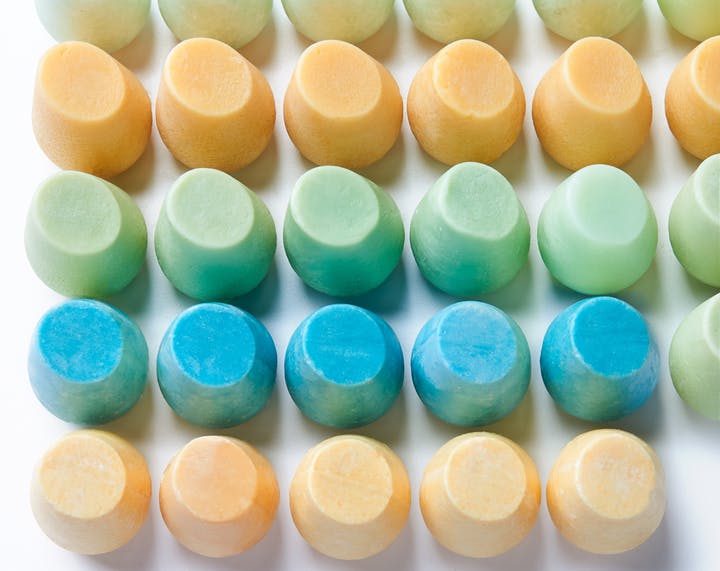By Catherine Roberts
Star Tribune
WWR Article Summary (tl;dr) After coming to the conclusion that something had to be done about the waste of plastic bottles on the environment, a group of friends created a shampoo in the form of a bar. The four partners have self-funded research and development, pilot tests and the initial launch of the “Hibar” at several markets and salons.
Star Tribune
Dion Hughes ran into friends Nora and Jay Schaper, owners of Bodylish beauty products, at a party a few years ago and asked them what they were working on.
The couple said they had become increasingly concerned over the number of plastic bottles in the bathroom and were trying to come up with a quality shampoo and conditioner that could be sold in bar form.
Hughes was dumbfounded because he was working on the same problem. He and his wife had gone on a Mexican vacation and witnessed all the plastic washing up on beaches. They looked at the dozen or so bottles in their shower and thought Hughes could make an impact working on a bar shampoo.
The three entrepreneur friends — Hughes is founder of marketing consultant Persuasion Arts & Sciences — called over another friend, Ward Olson, to run the idea by him. Olson built and sold eco-friendly pet-food company Sojos and was consulting at the time for Bodylish. He not only thought it was a good idea. He wanted in on it.
That’s how HiBar was born. Since then, the four partners have self-funded research and development, pilot tests and an initial launch at stores such as Tare Market (which sells products with little to no eco-friendly packaging), Linden Hills Co-op, Lakewinds Food Co-op and Mississippi Market Natural Food Co-op. The products also are sold at some salons in Sedona, Ariz., and the Twin Cities that helped with feedback throughout the process.
“For me personally, having come out of 20 years in the pet-food industry, I had a lot of knowledge of how to build a brand,” Johnson said. “But I was looking for something different. I needed a mission.”
One reason the business works, Nora said, is because everyone has different strengths.
Her husband is the formulator and rule-breaker. Hughes is the marketer and creative. Olson knows both how to build a business and disrupt a category and is a realist. And she has operational strengths and keeps them meeting deadlines.
Through most of the past two years, the four reached out for advice from peers and other eco-friendly ventures.
For the October launch, the quartet hired a professional chemist to figure out the formula on a manufacturing scale. They also hired someone for the branding, both for the final name HiBar and the packaging.
“We’re definitely in the early days,” Johnson said.
However, he said the process is moving much faster than his last venture. He thinks it’s because of the window of opportunity. Many people have the environment front of mind, so the company needs to hit the market now in order to change people’s habits.
Now comes the time that could make or break the company. The products are in stores, they are getting requests from other co-ops and eco-friendly stores. Focus groups said they have hit upon the right formula. And some of the largest stores in the category of eco-friendly are showing interest in HiBar.
Manufacturing is at capacity.
So over the next few months, the four need to decide whether the next steps will continue to be incremental, funded by the partners, or whether they will jump in big, finding outside investors to increase capacity fast. Both come with risks, the partners said, and they have been having spirited discussions about them.
“I think it’s been really fun. It’s been really creative. I look forward to every meeting we have,” said Jay Schaper. “All those tension points of a startup we are now facing.”
For example, California could be on the verge of passing a law banning the small bottles of toiletries that hotels distribute.
That’s a market, Nora Schaper said. “There’s a lot of opportunities, but we’ve got to hurry up,” she said.
Because HiBar is the only salon-quality bar shampoo that is trying to hit the wide market, as far as the partners know, the future is a “gray area.” The other bar products that are fairly widely distributed are soaps that are enhanced for hair, mostly lye-based. HiBar decided to use the gentler formulas found in high-end shampoos and conditioners.
Also, because of the target market, everything needs to be thought of in the lens of the environmental mission. They created packaging that is made of recycled cardboard and recyclable and fits the shampoo bar like a sleeve. The label is paper and acts as the closure. The ink is vegetable-based.
“I thought I was a pretty environmentally conscious person,” Johnson said. “But it shines a light on the rest of your life. You want to clean it up in all these other ways.”
As the hair products are more widely distributed, marketing needs to kick in as well, he said. It needs to show that hair care is one habit that can be changed without sacrificing anything.














































































































































































































































































































































































